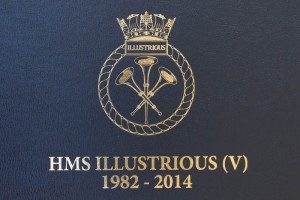HMS Illustrious (V) 1982-2014 was commissioned on behalf of the Royal Navy’s former Fleet Flagship, HMS Illustrious, primarily as a lasting record of the aircraft carrier’s rich heritage for members of the final Ship’s Company. It was also made available to the public via the National Museum of the Royal Navy.
The origins of the Royal Navy’s longest serving aircraft carrier date back to the early 1960s, when a series of studies were commissioned to establish the best design for a new class of escort cruisers. This work gained increased significance in the wake of the Government’s controversial cancellation of the fleet carrier CVA-01 in 1966 and led to the construction of the three Invincible class ships. Initially known as through deck cruisers for political reasons, the trio ensured the survival of aviation in the Royal Navy into the 21st century and laid the foundations for the significantly more capable Queen Elizabeth class carriers.
The fifth ship to bear the name, Illustrious was launched in 1978 by HRH Princess Margaret as the second member of Invincible class. The outbreak of the Falklands War in April 1982 triggered a round the clock operation to bring forward her completion by three months. Uniquely commissioned at sea, Illustrious sailed for the South Atlantic where she relieved her battle hardened elder sister Invincible and assumed responsibility for the air defence of the Falkland Islands until the extension of Stanley airfield’s runway was completed in October 1982. This remarkable deployment set the tone for an action packed 32 years of active service in which Illustrious steamed a total of 931,713 miles. The ship’s flexibility was clearly demonstrated by her ability to successfully operate in the anti-submarine, strike, commando, diplomatic, trade promotion and humanitarian relief roles.
On returning from the South Atlantic in 1982, Illustrious assumed her designated role of providing anti-submarine protection for NATO’s Strike Fleet Atlantic in a series of major exercises. Within hours of sailing as the flagship of Global 86 Task Group, Illustrious suffered a gearbox explosion. Despite the extensive damage, Illustrious rejoined the Task Group in Singapore for the most significant stages of the deployment after 13 weeks of repairs followed by the 8882 mile high speed passage from Portsmouth. In 1989 Illustrious paid off into reserve prior to a £156 million modernisation in Devonport. When she recommissioned five years later, Illustrious sailed to the Adriatic to help maintain the no-fly zone over Bosnia. During a subsequent tour of duty in the Adriatic in December 1995, she became one of the Royal Navy’s first warships to directly operate under NATO control. Members of the Ship’s Company participated in the ceremonies to mark the hand over of Hong Kong to China on 30 June 1997 while Illustrious remained on standby over the horizon to provide assistance if required. She deployed to the Gulf for the first time in January 1998 to assist the enforcement of the no-fly zone over southern Iraq.
The publication of the Strategic Defence Review in July 1998 confirmed that the Invincible class would spend their final years in commission operating the widest range of aircraft in a power projection role. This, coupled with the routine embarkation of the newly formed Joint Force 2000, ensured that they played a crucial role in the development of tactics and operating procedures for the Queen Elizabeth class carriers.
In 2000, Illustrious undertook a further tour of duty in the Gulf. During the return voyage, a mechanical failure on board an Iranian tanker at the head of the north bound convoy forced the Fleet Flagship to spend 24 hours trapped alongside in the Suez Canal. Shortly afterwards, her involvement in a routine NATO exercise was interrupted by the deteriorating situation in Sierra Leone when the British Government diverted the carrier to provide air cover during the evacuation of British nationals from the capital Freetown. She remained on station when the UK’s involvement in Sierra Leone extended to the provision of stability in the area while reinforcements arrived to strengthen the United Nations peacekeeping force.
From 2001 to 2002, Illustrious supported operations in Afghanistan following an overnight conversion at sea from the strike to the commando role. In 2006, along with HMS Bulwark, HMS Gloucester, HMS York, HMS St Albans and RFA Fort Victoria, she helped evacuate British citizens from Beirut during the Israel-Lebanon crisis. The retirement of the proven Harrier triggered the permanent conversion of Illustrious into a commando carrier in 2011. Two years later, during her final deployment East of Suez, she was diverted to the Philippines to play a major role in the international relief operation in the wake of Super Typhoon Haiyan. Illustrious concluded her active service by heading to Rosyth to participate in HMS Queen Elizabeth’s naming ceremony before returning to Portsmouth for the last time on 22 July 2014.
Painting a vivid picture of life on board one of the Royal Navy’s most important warships of the post war era, the author brings the story of Illustrious alive using interviews and first-hand accounts. As part of his research the author has interviewed a representative cross section of those involved in the ship’s rich heritage from junior sailors and members of the embarked squadrons, to all of the former Commanding Officers, as well as, the man responsible for her construction by Swan Hunter’s shipyard. The book is fully illustrated throughout with a rich selection of photographs, many of which are previously unpublished, and as such it is sure to appeal to all with an interest in the Royal Navy and its warships.
Foreword by: Admiral Sir Jock Slater GCB LVO DL
Introduction by: The Lady Sarah Chatto
Publisher: Royal Navy Decommissioning/Commissioning Books
1st Edition Hard Back released 2015
ISBN-978-0-9932984-0-0
pp312
RRP £25
